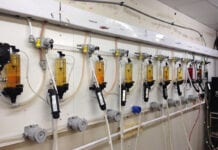Getting it right in the cellar is a big step towards getting it right in the glass

WITH winter proving a busy time for much of the trade, it can be easy to overlook some of the day-to-day tasks in and around the bar.
However, with beer quality determining the success of many licensed outlets, cellar duties shouldn’t be one of them.
Richard Cooper, managing director of Clear Brew in Glasgow, said: “It is important that beer quality remains consistently high at all times, but during the holiday period this should be emphasised, as it’s easy to forgo your good practice when things are busy.
“You should remember that every new customer at this time is a potential regular, but not if they are served sub-standard beer.”
Cooper added that it is “critical” that operators not only stick to their cellar management routine during the festive season, but that staff understand the importance of it to beer quality and sales success.
“Like anything, things go much easier if you manage good practice as you go along, rather than dealing with issues when they become critical,” he said.
Drinks dispense system supplier and maintenance firm Innserve agreed that good cellar management is vital to encouraging return custom.
“Employing best practices in cellar management, which includes incorporating technology to keep cellars cool and lines clean, is not only crucial but makes business sense, especially in areas where draught beers are popular,” said a spokesman for the firm.
“It can improve, enhance and streamline operations, adding to overall efficiency and generating savings. More importantly it maintains the quality of the beer which ultimately keeps customers coming back.
“Rigorous, weekly line cleans and quality beer go hand in hand. Every pub should have a routine cleaning schedule in place to ensure the cellar is kept in pristine condition.”
Innserve also recommends installing a thermometer to monitor cellar temperature as well as regularly topping up cooling equipment with water and ensuring fans and condensers are kept free from dust and blockages.
William Campbell, technical support and health and safety manager at Abergas Services, said the most common area where bar teams fall short in cellar management is staff training.
He said: “The advice that I would give would be to train all the bar staff in cellar management. Communication is key to improve performance.”
He added that Abergas carries out a cellar survey and outlet risk assessment and provides cellar management training for new clients.























